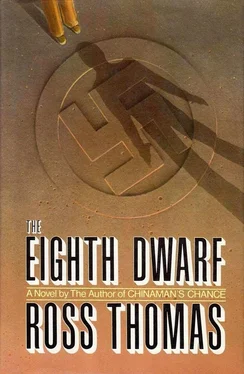About the only thing that distinguished the castle as a castle, and not as just another bombed-out ruin, was the determinedly Gothic tower at its north end. It was nearly four stories high, with crenelated walls and an imposing enough turret that was only half destroyed. Much of the castle’s outer walls also remained standing, although there was no longer anything left for them to protect or shield.
Had the neighboring Germans been disobedient enough to ignore the warning sign, or brave enough to risk an encounter with a Polish or Latvian desperado, they might have geen surprised at the new, solid-looking wooden door that led down to the area underneath the north tower which possibly, years ago, might have been a dungeon.
And the neighboring Germans would have been more surprised had they been able to watch the American Captain use his keys on the two stout padlocks that helped chain the door shut and then follow him down the old stone steps into that dank, cavernous space which was a dungeon no longer. Now, it was apparently a warehouse for all those hard-to-come-by American items which kept the black market flourishing.
There were cigarettes, for instance. One entire wall was stacked high with cases of them — not cartons, but cases. Stacked against another wall were jerry cans of gasoline — the pink, American kind which, if found in the possession of a German, automatically meant a long jail sentence. Food was stacked against a third wall. There were ten-in-one Army rations mostly, but there were also sacks of U.S. Army flour and ten or twelve cases — again not cartons, but cases — of candy bars. About half of them were Baby Ruths. The rest were a mixed lot of Hershey Bars, Oh Henrys, Mars Bars, and Powerhouses.
Against the remaining wall was where the light came from. It was a gasoline lantern that rested on an upended regulation Army footlocker. Next to the footlocker was an Army cot neatly made up. Two more lockers formed an L at the foot of the cot. On one of them was a small, two-burner gasoline stove. Not far from the footlockers was a crudely rigged pole that held six U.S. Army dress uniforms. On two of the uniforms were a captain’s double bars. Two more bore the single silver bars of a first lieutenant. The remaining two uniforms boasted the gold oak leaves of a major.
After securely locking from the inside the door that led to the underground room, the man in the captain’s uniform used a flashlight to guide himself down the stone steps. He lit the gasoline lantern first and then carefully hung up his tunic and placed his overseas cap on a peg. He seemed to be very neat.
He lit the small gasoline stove next, opened one of the footlockers, took out a tin of tea and some sugar and an aluminum pan. He poured water from a jerry can into the pan and placed it on the stove. He next removed a teapot and a cup and saucer from the footlocker, handling them carefully because all were Meissen. After the water was boiling he put a small handful of tea into the pot, poured in the water, lit a cigarette, and then lay down on the cot. With one arm behind his head, he smoked and stared up at the ceiling and waited for the tea to steep.
When the tea was ready, he slowly drank two cups and smoked four more cigarettes. After that, he glanced at his gold Longines wristwatch. It was 3:30 — almost time to go. He rose and crossed the room to yet another footlocker which rested next to the cans of gasoline. This one was locked. He removed the padlock and opened the lid. Inside were two .45 Thompson submachine guns, three .45 automatics, and two M-l carbines. There were also an S.&W. 38-caliber pistol and a Walther PPK automatic. He selected the Walther and shoved it into his right hip pocket.
After securing the padlock, he put the tunic with the captain’s bars on and selected a garrison cap. There were five gold overseas bars on his left sleeve, each indicating six months’ service outside the continental limits of the United States. On his right breast he wore a Combat Infantryman’s Badge and ribbons indicating that he had served in three battles in the European Theater and had been wounded once.
He inspected the room carefully to make sure that nothing was out of place. His eyes were a greenish blue, and they seemed to miss nothing. They looked out from a narrow face with a straight nose and thin lips that could have been either dubious or cruel or perhaps both. He was almost exactly six feet tall and slim, and his hair was that curious mixture which lies somewhere between brown and blond. It was cut short, and somewhere he had picked up a nice tan.
For the second time he checked to make sure that the gasoline stove was off. He then turned off the lamp, switched on his flashlight, patted his right hip pocket to check that the Walther was in place, and headed up the stone steps to where the jeep was parked just outside the thick wooden door.
The man who sold identities called himself Karl-Heinz Damm and, because of several judicious bribes to certain authorities, was permitted to live alone in a pleasant two-story house not six blocks from the high steel fence that the Americans had erected around the I. G. Farben complex in Frankfurt. For some reason, known only to themselves, the Americans had ignored Damm’s largely undamaged neighborhood when they were requisitioning housing. Instead, they had laid claim to the rather unpleasant and definitely lower-class area that immediately surrounded the Farben complex. Damm sometimes thought that the Americans felt more comfortable there.
Damm had acquired his house in late 1945, several months after his release from Dachau, where he had spent three awful years. An engraver by trade, he had wound up in Dachau after being convicted in 1942 of counterfeiting food-ration stamps. Because of his technical skills, the camp authorities had placed him in their administrative section — a job that gave him access to the camp records. By the time the Americans arrived at Dachau he had transformed himself into Karl-Heinz Damm, a minor trade-union official with a long record of opposition to the Nazi regime. The Americans had almost immediately offered him a job, which he had declined with thanks, giving as his excuse the grave heart condition — fully documented, of course — that he had developed as a result of the rigors of the camp.
He left Bavaria and headed almost immediately for Frankfurt, carrying with him only the carefully culled records of 100 former inmates of the camp; all of them dead, but with their deaths unrecorded; all of them political opponents to one degree or another of the former regime; all of them from the eastern reaches of Germany where the Russians were; and all of them, of course, Aryan by birth. And that was how Damm had acquired his house. He had traded its former owner, a minor and yet-undetected war criminal, a new identity for it. Word had got around — quietly, of course; very quietly — and now Damm was doing an extremely profitable, but extremely discreet business. He also dabbled a bit in the black market. Cigarettes mostly.
Damm was one of the few Germans in 1946 who had to watch their weight. With his newly found prosperity, he had made the mistake of gorging himself on a diet that some days had gone as high as 6,000 calories. Now he was on a self-imposed diet of 1,000 calories a day, which was just enough to keep an idle man alive and allow an active man to starve slowly. It was also just 48 calories less than the official ration in the British Zone.
At forty-three, Damm was a sleek-looking man of average height, carrying perhaps twenty-five too many pounds, which were now draped in an English tweed suit that he had acquired from a once-wealthy client, a former resident of Hamburg, whom the British were especially anxious to get their hands on. The client was now enjoying his new identity and living quietly near Saarbrücken, in the French Zone.
Читать дальше












